Brokerslink Conference2023 Report
Sao Paulo 19—20 October

Sao Paulo 19—20 October
Brokerslink would like to thank all sponsors for contributing to the success of the Brokerslink Conference 2023.
Platinum Sponsors
Gold sponsors
Silver Sponsors
Bronze Sponsors
Host Sponsor
Thursday, 19th October
Opening and welcome remarks
Lívia Bisoni, Conference MC
By brokers, for brokers: a journey of innovation and differentiation
José Manuel Fonseca, President & CEO, Brokerslink
Alliant International: relaunch overview
Adrian Lo, International – Vice President, Global Risk Management Leader
Jamie Crystal, Executive Vice President & Managing Director
Richard Stark, International – Senior Vice President, Project Specific Leader
New affiliate spotlight: Arachas, Ireland
Martin Flanagan, International Networks Director, Arachas
Global coverage dispute trends
David Pryce, Managing Partner, Fenchurch Law
Growth opportunities in captive management
Ronan Ryan, Chief Commercial Officer, Robus Group
Unlocking employee benefits: Brokerslink’s EB practice launch
Anne Collette, Business Development & Partnerships Director, Brokerslink
Gerard Baltazar, Chairman & CEO, In2Matrix Group
New affiliate spotlight:
Toyota Tsusho Insurance Management Corporation, Japan
Hiroki Yamada, Project Manager, Toyota Tsusho Corporation and Manager, Toyota Tsusho Insurance Management Corporation
Kenji Nagai, General Manager, Toyota Tusho Insurance Management Corporation
Update on the global trade credit insurance market
Marcel Farbelow, CEO, Allianz Trade
Miguel Carranza, Vice-President, Alliant
Phillip Krinker, Executive Director, CredRisk Seguros (MDS Group)
Rosana Padua, CEO, Coface Brazil
Global P&C market trends
Marc Poliquin, Senior Vice-President and Head of Property and Casualty in Latin America, Chubb
Closing remarks
Lívia Bisoni, Conference MC
Networking Dinner
Friday, 20th October
Opening
Adriana Bittar, Conference MC
Welcome remarks
José Manuel Fonseca, President & CEO, Brokerslink
Ariel Couto, Conference Chairman
PepsiCo Brazil: capturing opportunities in a volatile environment
Alexandre Carreteiro, President PepsiCo Brazil
The broker’s role in the value chain
Angelo Colombo, CEO Latin America, Swiss Re Corporate Solutions
Moderator: Ariel Couto, Conference Chairman
Angelo Colombo, CEO Latin America, Swiss Re Corporate Solutions
Grégory Allard, CEO, Filhet-Allard
Manuel Padilla, Vice President, Risk Management & Insurance, MacAndrews & Forbes
Adventures in Insurance: a personal journey
Ralph Mucerino, Principal, RPM Strategy & Management Consulting
Panel discussion:
technology shaping insurance
Moderator: Gustavo Doria, Founder, CQCS media
Bruno Porte, VP of Transformation, Tech & Data, Axa Brazil
Gustavo Leança, Director for Insurance, Capgemini Brazil
Ross Sinclair, CEO and Founder, EIP
Inclusive culture and diversity: global and plural organizations
Rachel Maia, Founder and CEO, RM Consulting
London contingency market – emerging issues and trends
Joe Arnold, Chief Growth Officer & Co-Founder, 1783 Group
Diving into Africa’s insurance landscape with SanlamAllianz
Anne Collette, Business Development & Partnerships Director, Brokerslink
Youssef Benabdallah, Head of Business Development, SanlamAllianz
Casa José Coltro
Mariana Guglielmetti, Board Member and Former CEO
The Amazon Rainforest: climate events, economic impacts, and risk analysis for climate change related insurance
Alexandre da Rosa, Founder and CEO WMF Energy
Closing Remarks
José Manuel Fonseca, President & CEO, Brokerslink
Conference 2024 announcement
José Manuel Fonseca, President & CEO, Brokerslink
Tatiana Aki, Vice Chairperson, AIC
Gala Dinner

We welcome our readers to a captivating journey as we reflect on the Brokerslink Conference 2023, held in Sao Paulo, Brazil, between 18 and 20 of October.
Set against the backdrop of Sao Paulo, a city with a beating heart full of energy and diversity, the conference was as a remarkable convergence of global insurance leaders, risk managers and industry enthusiasts. Lívia Bisoni, set the tone for the event, highlighting Sao Paulo’s unique blend of vibrancy and international appeal.
The conference agenda covered a compelling range of topics, from internal affairs and market trends to capital solutions and insightful break-out sessions. The first day explored Brokerslink’s internal matters, with significant announcements culminating in sessions focused on navigating the African and London insurance markets.
The second day, hosted by journalist Adriana Bittar, brought together brokers, insurers, risk managers and guests from 88 countries. This day highlighted the central role of collaboration and growth in the insurance industry, centering on the opportunities presented by the dynamic Brazilian market landscape.
Our conference is global and international in nature. We focus on sharing great content and creating an agenda rich in insight and context. It is a stimulating environment to explore converging risks and encourage meaningful conversations and networking among attendees.
As you immerse yourself in the stories and insights shared in these pages, remember that the Brokerslink Conference transcends geographical boundaries. It serves as a melting pot of knowledge, fostering collaboration and providing a platform for professionals to learn, share and envision the future of global insurance.
Embark on this journey with us!
José Manuel Fonseca President and CEO, Brokerslink
The insurance industry faces many challenges in today’s dynamic and interconnected world. These challenges stem from various factors, including technological advances, evolving client expectations and a changing global order. Insurance companies, brokers and risk managers must adapt their strategies and embrace innovation to navigate these complexities and remain competitive.
One of the challenges is the changing nature of client expectations. Today’s clients are more informed and demanding than ever before. They expect personalised products, immediate service and transparent pricing. Insurers and brokers must adapt their offerings and communication channels to meet these expectations and build lasting client relationships.
According to Gustavo Leança, Director for Insurance at Capgemini Brazil, one-size-fits-all solutions are no longer effective. “Brokers need to be able to collect and analyse data to understand their clients better and provide them with the best possible products and services.” Technology can help brokers personalise their offerings, automate processes and collect and analyse data.
In addition, the increasing frequency and severity of natural catastrophes due to climate change pose significant risks to insurers. Extreme weather events such as hurricanes, floods and wildfires cause billions of dollars of damage annually. Insurers must adopt better risk assessment models and pricing strategies to mitigate these risks and maintain profitability.
“In a world without climate change, insurance costs would be significantly lower because of fewer extreme weather events. These can cause billions of dollars of damage each year and are becoming more frequent and severe due to climate change,” said Alexandre da Rosa, Founder and CEO WMF Energy.
Alexandre Carreteiro, CEO of Pepsico in Brazil, said that sustainability is a top priority for the company and that it is working to transform its business. “We are investing in ESG and people, and working to reduce our environmental impact across the value chain. PepsiCo Brazil is also committed to creating a diverse and inclusive workplace.”
The pandemic has also brought new challenges to the insurance market that require tailored solutions. One of these is the increase in cyber-attacks. As more and more companies adopt hybrid working models and move their content to the cloud (making it available to all employees anywhere, anytime), there is less control and security.”
Another challenge posed by the pandemic was for event cancellation insurers and brokers. Event cancellation policies cover the postponement, cancellation and relocation of an event and any force majeure risk that would dictate that the event would be dangerous or impossible to hold. Underwriters in the contingency segment have faced several new considerations in recent years.
Such adversities present both a challenge and an opportunity for the insurance industry. On the one hand, insurers may not be comfortable being seen as the solution to global events, such as the COVID-19 pandemic, which can go beyond insurance and need addressing at a governmental level. But on the other hand, if policyholders expect insurers and brokers to play a more significant role in solving these problems, this could lead to increased demand for insurance and profitable opportunities for all.
Brokerslink’s recent transformation, which includes a revised structure, a refined strategy and an expanded global presence, presents a compelling opportunity for network partners and affiliates to enhance their role. By adopting a fresh perspective on client engagement and collaborating in tailored solutions we can demonstrate the adaptability of insurance to meet the evolving challenges of the present and future, whatever form they may take.

As the world and the insurance market continue to evolve, it becomes increasingly evident that prioritising people is vital for business success. This belief is central to the essence of Brokerslink, as described by José Manuel Fonseca, President and CEO of Brokerslink, while opening the first-ever Brokerslink Conference held in Latin America.
“In 2004, me and a group of other brokers started Brokerslink to protect our clients and take more control over our businesses. From its inception, Brokerslink is a human relationship-based company. Our brokers know each other and are connected to our business. We are a network of equals among differences. There is no real centre for the company as every partner shoulders responsibilities, fostering a decentralised structure for shared success.” said José.
Brokerslink started small, from zero, growing step by step. Allowing the company to understand, meet, and get acquainted with each of its new affiliates, creating a solid worldwide link. According to Fonseca, “Today we are a global broking company, that owns and manages a network.”
“By 2023, we had a presence in 133 countries,” Fonseca added, highlighting that the individuality of each new company is welcomed and celebrated, creating a network rooted in its unique DNA and culture.
A pivotal moment in Brokerslink’s evolution occurred with the launch of Agora, an innovative technology solution. Fonseca explains, “Agora provides partners and affiliates access to specialist local knowledge of colleagues worldwide and enables the network to collaborate on new business opportunities easily.” This technological leap propelled Brokerslink into a new global connectivity and collaboration era.
“We have an empowering culture. Our resources exist to create value and to capacitate. So, we have invested in differentiative tools, proprietary technology, and in our brand reputation. We take great pride in our brand as it is now internationally recognised. All of this is what makes us unique in business”, celebrates José Manuel.
As Brokerslink looks ahead, Fonseca’s enthusiasm is palpable: “We plan to continue to grow our network and be a premier global broking company that enables a collaborative ecosystem. I am very excited about Brokerslink’s future. Our unique model is the best way to serve our clients in the ever-changing insurance world.”
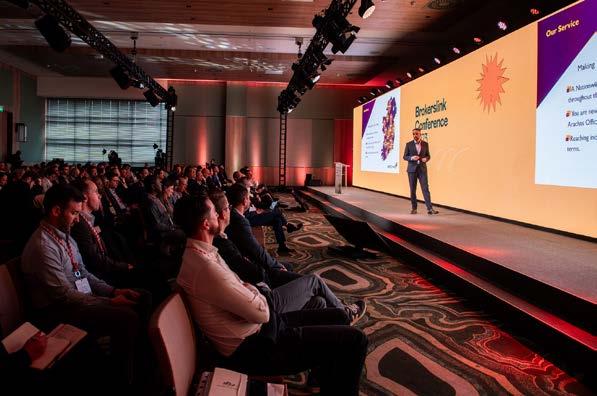
Brokerslink is a global network of insurance brokers that has attracted over 110 broker and non-broker partners and affiliates in less than two decades. The company’s continued growth is partly due to its ability to attract firms with diverse capabilities. Some new affiliates shared their motivation for teaming with Brokerslink during this year’s conference.
Arachas Corporate Brokers, Ireland’s largest insurance broker, also recently joined the ranks of Brokerslink as a new affiliate. Boasting a team of over 700 specialists, Arachas is well-equipped to guide clients through the intricacies of the Irish insurance landscape and sees potential for reverse flow business from Brazil. Martin Flanagan, the International Networks Director of Arachas, shared at the conference that the company is focused on growing its international business across its key business segments –from manufacturing to renewable energy, construction to professional lines and all other key commercial insurance areas. Arachas aims to leverage its specialised knowledge to contribute to Brokerslink’s network growth and enhance the collaborative landscape
Toyota Tsusho Insurance Management Corporation (TIM) is a leading global insurance broker with a strong track record of providing innovative and cost-effective solutions to its clients. It was originally founded to provide broking services for Japan’s Toyota Group companies, and has now broadened its scope to provide services to global corporates.
The company is dedicated to building long-term relationships with its clients and partners, and its values of trust, customer orientation, professionalism, safety, and compliance echo in everything it does. It is committed to providing its clients with the best possible risk management solutions worldwide, including places where it has yet to operate.
“We are looking to expand our global insurance business to non-Toyota Group companies, and we are interested in collaborating with the Brokerslink network in countries where we do not have offices. We believe that the Brokerslink network will increase our global risk transfer options, “ said Hiroki Yamada, TIM’s Project Manager.
The partnerships with Arachas and TIM illustrate Brokerslink’s ability to attract and unite various insurance brokers globally. These collaborations enhance the offerings for Brokerslink’s partners and affiliates and enable the network to play a pivotal role in facilitating international business expansion and fostering innovative solutions across various sectors. As a global organisation, Brokerslink remains committed to continuous growth, evolution, and adaptation, ensuring it stays at the forefront of addressing evolving client needs and providing steadfast support worldwide.

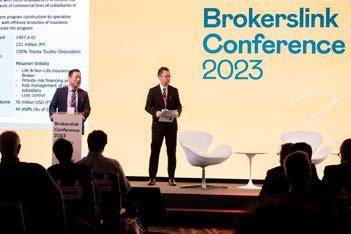
BUSINESS
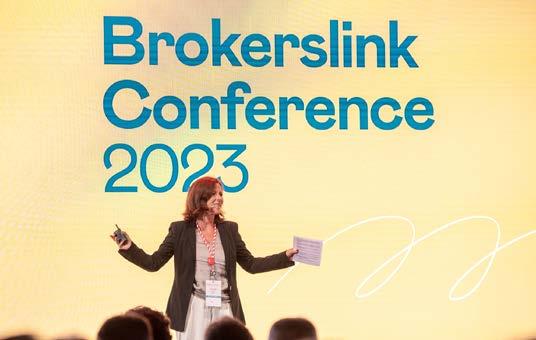
In line with the “war on talent” and new cutting-edge benefits available in the market, Brokerslink acknowledges the importance of providing tailored solutions to employees across the world. To this end, Brokerslink has announced its new Employee Benefits (EB) Practice, specially designed to offer brokers, client companies and beneficiaries a range of innovative, flexible, and cost-effective benefit schemes that cater to their needs.
The EB Practice is managed by Anne Collette, Business Development and Partnerships Director of Brokerslink, and Gerard Baltazar, EB Practice Leader and CEO of In2Matrix Group. The scope of the EB Practice is to provide brokers with support, access to world-class expertise, and comprehensive solutions to help them grow and strengthen their international EB capabilities. The practice will integrate the increased focus on flexibility, tailored leaves, and
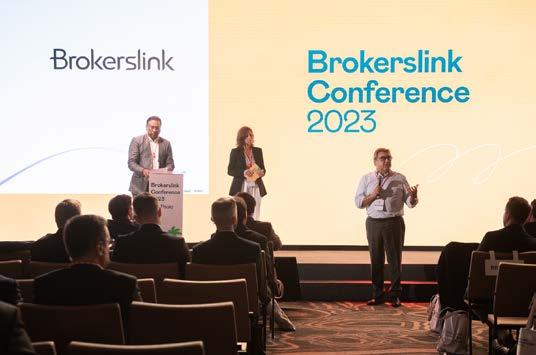
mental health, to provide clients with best fit products and services. Benefit packages developed will include global mobility, multinational pooling, Global Benefits Management, as well as Pan-European and Pan-African group plans.
“We are excited to launch our new EB practice,” said Gerard Baltazar. “The EB market is growing rapidly, and we are committed to providing our brokers and clients with the best possible solutions.”
In a proactive stance, Brokerslink engages closely with brokers and client companies to comprehend their specific needs, like adapting to hybrid work arrangements and commitment to employee well-being, and subsequently implementing solutions tailored to their requirements.
For this, the EB Practice collaborates with a dedicated expert core team from different regions across the world, who are selected to address diverse levels of market maturity and ensure that its offering adheres to all respective laws and regulations.
This strategic approach underscores Brokerslink’s commitment to delivering exceptional solutions in a dynamic and evolving global landscape.
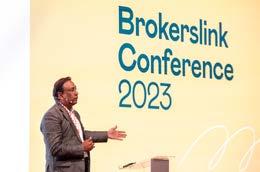

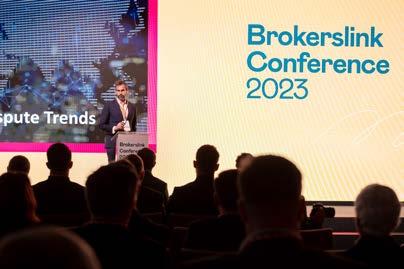 David Pryce MANAGING PARTNER, FENCHURCH LAW
David Pryce MANAGING PARTNER, FENCHURCH LAW
Insurance companies are pivotal in addressing the world’s pressing issues by offering vital financial protection against various risks, including natural disasters, illnesses, accidents, and property loss. This demonstrates the crucial need for the insurance market to take a leading role in tackling society’s challenges.
According to David Pryce, a lawyer specialising in the industry, policyholders are looking to insurers to solve problems that governments should solve. “This is evident in the types of coverage disputes arising, such as those related to the COVID-19 pandemic, war risks, fire safety, climate change, and ransomware”, said the executive.
Pryce suggested that this trend presents both a challenge and an opportunity for the insurance industry. “Insurers may not be comfortable with being seen as the solution to society’s problems. On the other hand, if policyholders are looking to insurers to pay a larger part in solving these problems, that could lead to more demand for insurance and higher profits for insurers”.
The expert concluded by asserting that the insurance sector is responsible for actively contributing to solving societal problems. He warned of potential consequences, including a loss of trust in insurance and a decline in demand for insurance products, should the industry fail to meet this obligation.
Pryce’s comments suggest that the insurance industry is at a crossroads. It faces the choice of continuing to prioritise profits, leaving societal problem-solving to governments, or embracing a leadership role in addressing these challenges, with the prospect of reaping the rewards of heightened demand and increased profitability.
The decisions that the insurance industry makes will unfold over time, he concluded, however, should it take a proactive stance in addressing society’s challenges, it creates a mutually beneficial scenario for both the industry and policyholders.
In an era marked by dynamic shifts in risk management strategies, the spotlight is on captive insurance, a formidable and formally regulated tool reshaping the insurance landscape. Ronan Ryan, Chief Commercial Officer of the Robus Group, guided Brokerslink Conference’s attendees through a journey in the captive management world.
Captive insurance, characterised by being a regulated insurance entity owned and steered by a parent company, isn’t just a financial instrument; it’s a strategic ally revolutionising how companies perceive and manage risk. Ronan Ryan explained the myriad of advantages companies stand to gain; reduced risk costs, enhanced cash flow, unprecedented control over coverage and claims, access to reinsurance markets, and a newfound flexibility in underwriting risks.
The canvas of captives is rich and diverse, featuring stand-alone insurance companies, protected cell companies, and incorporated cell companies. As Ryan advises, selecting the most fitting captive structure requires a meticulous examination of a company’s unique needs and objectives.
While captives have proven their strategic value across a diverse portfolio of business sizes, their true potential shines in larger companies with complex insurance programs. Ryan invited insurance professionals and brokers to explore the intricacies of captives and the transformative possibilities they hold for their clients.
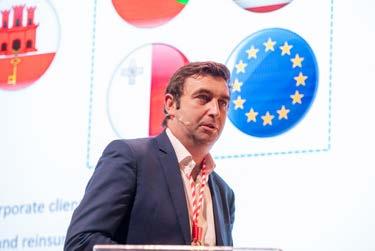
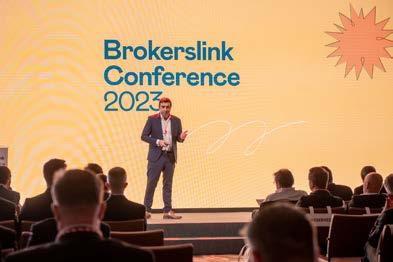
Captive insurance isn’t merely a cost-cutting measure; it’s a potent tool for companies to unravel and manage risks with unprecedented precision. The microscopic insights gleaned through captives empower companies to proactively refine their risk management practices, ushering in a new era of strategic risk management.
Upon closer examination, captives can provide access to capital sources that may be difficult to obtain, particularly for industries with a high level of risk. Similarly, captives offer a range of benefits, such as the building up of reserves to fund future losses and using underwriting profits to smooth premium levels in a hardening market. A softer benefit that is often overlooked, is that the very establishment of a captive sends a strong message to the insurance market that:
The organisation has analysed its exposures and has determined what level of risk it is prepared to retain • Is prepared to commit its own capital to support that retention of risk
Has taken a long-term decision to retain risk and may have a growing appetite for risk retention
These factors lead insurers to understand that there will be competition for premium not just from their competitors but also from within the parent organisation in the form of the captive.
These benefits make captives even more appealing.
As companies contemplate the world of captive insurance, Ronan Ryan emphasised the need for meticulous research and collaboration with seasoned professionals. With their complex nature, captives demand a nuanced understanding of the associated risks and rewards before deciding.
The contemporary insurance landscape, shaped by challenging market conditions, has sparked a surge in captive inquiries. Ronan Ryan cited examples of professional firms grappling with rising costs and cover restrictions in professional indemnity coverage. The demand for self-insurance through captive structures intensifies as cover restrictions persist and external market coverage becomes challenging to procure, particularly in specialised areas like cyber insurance.
As the insurance industry evolves, captives emerge as financial instruments and strategic companions, aligning risk management with broader business objectives.

In the global landscape, the trade credit market is witnessing substantial growth due to the increasing need for companies worldwide to protect themselves against the risks of client insolvencies. The recent case of Americanas S.A., a Brazilian retailer filing for judicial recovery in January 2023 due to accounting irregularities, illustrates the global challenges trade credit insurers face.
At the panel session, industry experts explored the challenges and opportunities inherent in this insurance sector. The Americanas case marked a considerable loss for insurers as the company held approximately 3 billion reais in insurance policies.
Low insurance penetration is a shared challenge, with on average only 13% of companies having trade credit insurance globally, with Brazil significantly lower than this. In response, insurers are actively addressing this gap by raising awareness about the benefits of trade credit insurance and devising more accessible products. Collaborations with banks and financial intermediaries further facilitate the distribution of these insurance solutions.
The global trade credit market’s expansion creates an opportunity for Brazilian trade credit insurers, especially as national companies increasingly engage in international trade. To address this, Brazilian insurers are investing in technology, employing artificial intelligence to assess credit risks and automate policy underwriting processes, enhancing efficiency and client service quality.
Despite challenges, optimism prevails among trade credit insurers in Brazil. The global trade credit insurance market is burgeoning, and companies recognise the importance of shielding their businesses from the risks of client insolvencies.
“Trade credit insurance is a growing market, with a global value of $11 billion in 2021 and an expected growth
rate of 10-30% per year”, said Phillip Krinker, Executive Director of CredRisk Seguros. The market is dominated by large corporations, accounting for $8 billion written premium, while middle-sized and small enterprises contribute $1.7 billion and $1.3 billion, respectively.
Key sectors in the market include manufacturing ($3.3 billion), construction ($2.2 billion), and IT and telecom ($1.7 billion). While Europe leads the global market with $4.2 billion, Asia is growing rapidly at $3.3 billion, and North America holds a $2 billion market share. Latin America, the Middle East, and Africa collectively account for the remaining $1.5 billion.
Miguel Carranza, Vice-President at Alliant, addressed global economic challenges affecting the trade credit insurance market, emphasising its crucial role in mitigating risks associated with client insolvencies, particularly during economic uncertainty.
Rosana Passos de Pádua, CEO of Coface Brazil, reflected on the Americanas case, emphasising the transformative impact on perceptions of credit risk in the industry. She highlighted the misconception that solid financial statements negate the need for credit insurance, emphasising the invaluable safety net it provides.
Marcel Farbelow, CEO of Allianz Trade, shared strategies for increasing trade credit insurance sales globally, emphasising the importance of awareness, collaboration with partners, product and technology enhancements, and collaboration with banks. Farbelow expressed confidence that these actions would make trade credit insurance more accessible and beneficial for businesses of all sizes, supporting their growth while protecting against the risk of client insolvency.
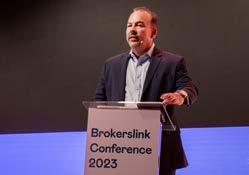 Marc Poliquin
Marc Poliquin
Amid the evolving dynamics of the global property and casualty (P&C) insurance market, there are notable opportunities for growth, particularly in nearshoring and renewables. The market, as a whole, is witnessing shifts due to economic changes, creating fertile ground for exploration.
Within this landscape, companies like Chubb, a prominent player in the P&C insurance sector, are strategically positioning themselves to capitalise on these opportunities. Marc Poliquin, Senior Vice-President and Head of Property and Casualty for Chubb in Latin America, talked about the potential for expansion in both nearshoring and renewables at the Brokerslink Conference in Sao Paulo. The company aims to assist businesses in navigating these trends by offering tailored solutions that address the risks associated with dependencies on foreign suppliers.
In response to the changing needs of the global market, Poliquin introduced specialised policies designed exclusively for renewable energy projects. This movement aligns with the remarkable 20% growth observed in the renewable energy sector in 2023.
Concerning the market environment, the Executive’s presentation indicated upward rate trends in property and casualty lines. Influencing factors include the automotive chip shortage and the implications of the new European Directive, which is particularly challenging for the sustainability sector.
In an era where nearshoring gains prominence for its strategic advantages, the broader insurance industry recognises the importance of reducing reliance on foreign suppliers. This strategic move enhances national security by mitigating supply chain risks and contributes to economic growth by creating jobs. Furthermore, active involvement in nearshoring fosters more robust relationships with neighbouring countries, promoting greater cooperation on security and other critical issues.
The global P&C market is undergoing transformative changes, illustrated by Chubb’s strategic endeavours. The focus on nearshoring and renewable energy projects becomes evident amid economic shifts. The collaboration of industry leaders will shape the future of risk management, ensuring sustained growth in our dynamic global business landscape.





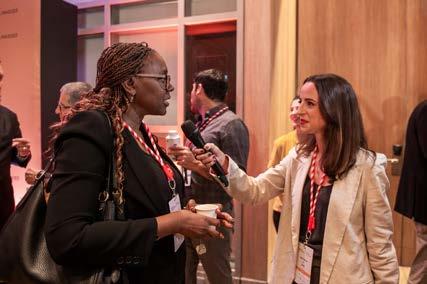

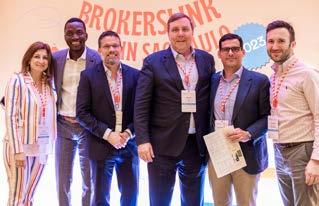





4.1

AI is swiftly reshaping the insurance landscape, presenting opportunities to bolster efficiency, personalise client experiences, and mitigate risks. Its capacity to scrutinise extensive datasets, encompassing client demographics, behavioural patterns, and historical claims, empowers insurers to make well-informed underwriting, pricing, and fraud detection decisions. This, in turn, results in more precise risk assessments, tailored insurance products, and cost reductions for insurers and policyholders alike.
Jorge Luzzi, Global CEO of RCG, highlighted the pivotal role of data during the 5th edition of the Risk Managers Forum sponsored by Tokio Marine Seguradora. Luzzi stressed, to the 50 risk managers present, that the success of AI systems hinges on the quality and quantity of data available to them. He emphasised the importance of responsible data collection, cybersecurity, and collaboration, stating, “Companies cannot tackle the challenges posed by AI and ESG alone. They must work with regulators, insurers, and other stakeholders to develop effective and ethical solutions.”
The Forum provided a valuable opportunity for risk managers to explore the latest AI and ESG trends and foster networking and discussions that will shape how companies approach risk management and investment strategies in the future.
AI is a powerful tool for improving risk management by analysing large datasets, identifying patterns, and enhancing the accuracy of risk models. Adilson Lavrador, Executive Director of Operations, IT, and Claims at Tokio Marine Seguradora, emphasised the strategic importance of managing data effectively. He highlighted that companies possessing data as an asset must do so strategically, highlighting AI’s pivotal role in risk assessment and claims evaluation.
Ethical considerations in deploying new technologies, including AI, were highlighted, emphasising the need to carefully evaluate implications before implementation. The rising significance of ESG factors in investment decisions were also stressed, with companies encouraged to implement policies promoting diversity, reducing environmental impact, and improving corporate governance.
The collaboration became a recurring theme, emphasising the call for stakeholders to partner with regulators and insurers. The aim is to establish guidelines for the responsible use of AI and create insurance products that address the risks associated with emerging technologies.
Javier Mirabal, Director of North America for RCG, presented a material prepared by Thiago Amorim, Risk Manager at iFood, where was discussed how iFood uses AI to grow and handle accidents for drivers and fraud. He said they use machine learning to identify the parameters of accident events and a recognition model to process the information. Mirabal also noted that iFood is working to reduce the number of claims and that AI plays a vital role in this effort.
Maurizio Castelli, from Augustas Risk Services, spoke about the use of AI to monitor employees in the workplace. He said this type of monitoring aims to identify and handle risks appropriately. Castelli also discussed the importance of protecting employee data and privacy. He said that companies should only use AI for monitoring purposes if they have a legitimate reason to do so and should be transparent with their employees about how their data is handled.
Discussions explored the key question of how to use AI to improve profitability, with Maurizio Castelli highlighting its potential in automating tasks, improving decision-making, and creating new products and services.
Adilson Lavrador noted pandemic-induced changes, including hybrid work models, impacting control and security, making companies more vulnerable to risks such as cyberattacks. The Tokio Marine executive also stated that he believes AI’s growth is complementary to human intelligence, not a replacement, particularly for specific companies.

At the end, a round table for opinion of the different risk managers attending the event was open with the participation (among others) of Danilo Alexandrino of Ceva Logistic, Marcelo Scarpato of Oxiteno, Elizangela Bayer of Vivo, Carla Karwacka of Claro, Paulo Luz of Pepsico, Raphael Tasseli of Suzano, Ricardo Ferreira of Sabesp, Chistian Mendonça of Hydro Brasil, Carlos Oliveira of Unipar, Ida Patrícia de Sá of Natura, Manuel Padilla of Mackandrews & Forbes (and also Board Member of RIMS in USA).
Despite challenges, the benefits of AI in risk management, including improved decision-making and efficiency, far outweigh the risks, setting the stage for continued impactful developments in the insurance industry.
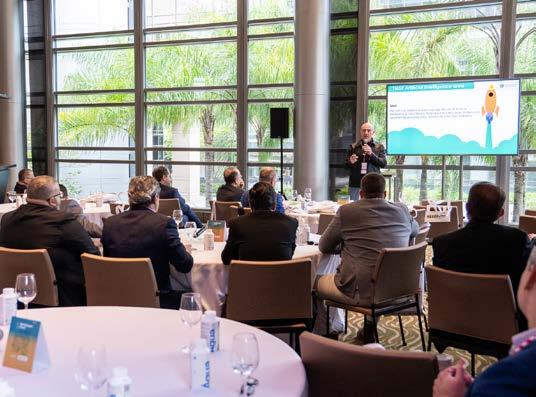





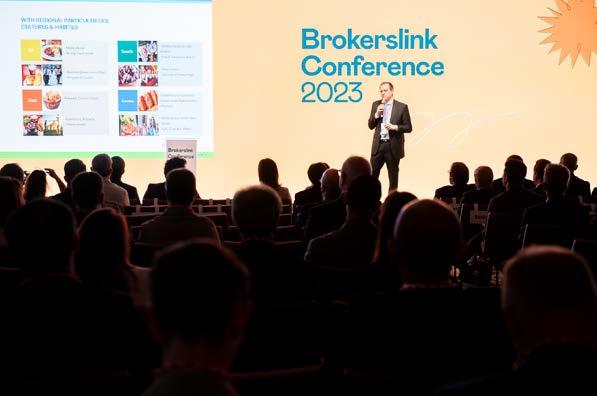
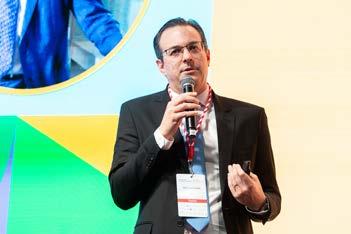
The insurance industry is filled with opportunities and challenges for brokers, insurers, and other industries that rely on its support, especially during crises. PepsiCo Brazil CEO Alexandre Carreteiro said he sees a significant transformation in the insurance industry, and digitalisation is playing an essential role in that. The executive claimed that insurance companies understand risk well, and PepsiCo can learn much from them.
Carreteiro’s comments came as PepsiCo Brazil is working to transform its own business. The company is focusing on its categories of salty snacks and beverages and investing in ESG and people. Sustainability is a top priority for PepsiCo Brazil, and the company is working to reduce its environmental impact across its entire value chain. PepsiCo Brazil is also committed to creating a diverse and inclusive workplace.
“I see many opportunities for collaboration between PepsiCo Brazil and the insurance industry in two key areas: cyberspace and agriculture. Cyber risk is already in the country and will only grow in the future. Companies and the insurance industry can work together to mitigate these risks”, said the CEO. He also noted that weather risk is a significant concern for farmers, and technology can play a role in helping to manage this risk more effectively.
The executive is optimistic about the future of PepsiCo Brazil. “PepsiCo has a strong team, a great portfolio of products, and a commitment to sustainability, diversity, equity, and inclusion. We are well-positioned to capture the opportunities in this market and positively impact the lives of Brazilians”, he said.
Alexandre also expressed his hope that PepsiCo Brazil can work alongside the insurance industry to make this happen. “The insurance industry can help PepsiCo Brazil guarantee risk prevention and management.”
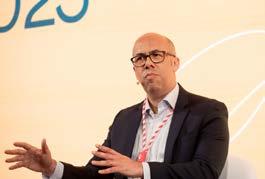
In the ever-evolving world of insurance, Angelo Colombo, CEO Brazil and Latin America at Swiss Re Corporate Solutions, has pinpointed a transformative tool—digital twins of assets and portfolios. Colombo emphasised three pivotal areas where digital twins can empower clients in navigating the complexities of modern supply chains: data acquisition and ingestion, data enrichment and analytics, and decision-making and optimisation.
In data acquisition, digital twins prove instrumental in consolidating diverse data sources—internal systems, third-party data providers, and sensors—providing a comprehensive view of client assets. The journey continues with data enrichment and analytics, where digital twins add depth to data with historical insights, risk assessments, and market intelligence, enabling clients to make more informed decisions about risk management.
Ultimately, in decision-making and optimisation, digital twins emerge as powerful tools for simulating scenarios, allowing clients to gauge the impact of various decisions on risk and performance. Colombo acknowledged that the insurance industry is playing catch-up in digital twins but stressed its vast potential to offer clients valuable data and expertise.
“Brokers are uniquely positioned to help clients implement digital twins,” the CEO stated. “They deeply understand the client’s business and the insurance market. They can also help clients overcome data integration and change management challenges.”
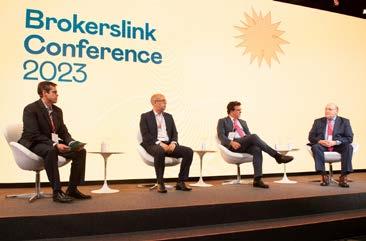
During the panel discussion, the focus was on the changing dynamics of brokers as strategic partners in the insurance industry. Angelo Colombo’s presentation inspired the topic. Ariel Couto, the CEO of MDS Brazil and Americas Regional Manager at Brokerslink, moderated the exchange between panellists Manuel Padilla, Vice President of Risk Management and Insurance at MacAndrews & Forbes, and Grégory Allard, CEO of Filhet-Allard.
The panellists observed that the insurance industry faces a crossroads marked by the adoption of digital twins and the dynamic evolution of brokers. These changes present a dual scenario of opportunities and challenges for insurers. Digital twins, virtual replicas of physical assets or systems, offer the potential for insurers to craft tailor-made products and services, such as risk-based insurance and predictive maintenance.
However, adopting digital twins demands significant investments in data analytics and digital capabilities by insurers. Brokers, who once focused on selling insurance products, are now stepping into a new era, providing value-added services like risk management consulting and claims assistance. This shift, propelled by increasing risk complexities and client demands, positions brokers strategically for future success.
The synergy between brokers, risk managers, and insurance carriers is transforming from distinct roles to a more collaborative approach. As the three entities work together, comprehensive risk management solutions evolve, aligning with the need for a holistic approach.
Overall, the top three factors steering client choices in insurance providers—Risk Management Team Support (50%), Network/Market Access (20%), and Customised Solutions (10%)—are precisely the areas where digital twins shine. The comprehensive insights provided by digital twins enable robust support from risk management teams, broaden network and market access, and facilitate the crafting of customised solutions tailored to individual client needs.
In an industry marked by change, insurers, brokers, and risk managers who adeptly adapt to these shifts stand poised for future success. The collaborative efforts between these entities are embracing digital twins and redefining the contours of effective risk management solutions.
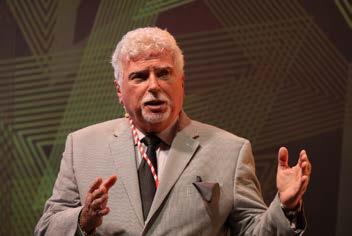
Globalisation and technology are revolutionising every aspect of people’s and businesses’ daily lives. And that includes all segments. Ralph Mucerino, Principal at RPM Strategy & Management Consulting, a senior executive with over 40 years of experience in the insurance industry, shared his perspective on how technology and globalisation have been changing the industry.
“I have seen the impact of technology and globalisation firsthand in my career. I started as a mid-level manager in a domestic insurance company. The company was very tribal, with each department operating independently, which led to redundant investments and inefficient processes”, said Mucerino.
The executive was appointed head of operations and IT to fix this problem. Mucerino was responsible for bringing all the departments together and implementing a single set of standards for operations and technology. It was a challenging task, but he succeeded with the help of a team of dedicated IT professionals.
The executive learned from his experiences throughout his career as he was exposed to diverse cultures, global business practices and innovative projects. Mucerino told the audience about a valuable lesson he learned while working in IT: “Technology is a tool, not a solution. It is important to use technology effectively to improve efficiency, competitiveness, and client service”.
The insurance industry has a long history of innovation and resilience. It is well-positioned to meet evolving challenges, including climate change, cyber risk, and technological disruption. “Technology and globalisation will continue to shape the insurance industry’s future. Insurance companies that can adapt to these changes and develop new products and services to meet the needs of a globalised client base will be the ones that succeed”, concluded Mucerino.
CEO AND FOUNDER OF EIP
The dynamics of the insurance landscape came to the forefront in the panel discussion on technology, moderated by Gustavo Doria, Founder of CQCS Media. The engaging dialogue featured insights from three prominent executives: Gustavo Leança, Director for Insurance at Capgemini Brazil; Bruno Porte, VP of Transformation, Tech, and Data at Axa Brazil; and Ross Sinclair, CEO and Founder of EIP.
The introduction of the CARE model, a pioneering insurance paradigm crafted by Capgemini after conducting interviews with over 42,000 clients, kicked off the conversation. At its core, the CARE model focuses on three pillars: convenience, advice, and reach.
Clients today yearn for seamless access to policy information, the ability to manage risk profiles effortlessly, personalised advice from insurers, and additional value in risk prevention services. The CARE model, designed around these principles, emerges as a potent strategy for insurers to tackle contemporary challenges.
The convenience, advice, and reach triad can be actualised by leveraging intelligent communication tools. This involves providing 24/7 support, automating tasks like policy renewals and claims processing, and utilising digital channels for client engagement. Brokers, too, hold a pivotal role in this transformation, enhancing their services through smart tools, automation, and data-driven insights.
Embedded insurance, a rising trend, adds another layer to this technological metamorphosis. This innovative approach makes insurance more accessible and affordable.

The speakers highlighted the importance of relevance, ease of onboarding, and fulfilment of promises as crucial factors for the success of embedded insurance.
The potential impact of embedded insurance isn’t limited to client accessibility alone. The speakers expressed enthusiasm about its ability to reshape the insurance landscape by fostering collaboration. By offering APIs and supporting digital processes, insurance companies can play a crucial role in brokers’ digitalisation.
As the speakers focused on the challenges facing brokers and carriers, a recurring theme emerged - the era of one-size-fits-all solutions is over. Executives emphasised the need for personalised offerings, which requires brokers to be adept at collecting and analysing data. Technology emerged as the solution, enabling personalised offerings, process automation and efficient use of data.
Generative AI emerged as a game-changer, promising to revolutionise client communications. Intelligent chatbots, robotic process automation (RPA), and data analytics were highlighted as tools to provide 24/7 support, automate tasks, and glean valuable insights for more personalised client experiences.
In conclusion, the transformative potential of technology in the insurance industry is evident. By leveraging innovative technologies to personalise offerings, automate processes, and analyse data, brokers and carriers can meet and exceed client expectations, fostering growth and resilience in an ever-evolving market.
Contingency insurance is a strategic shield against unforeseen disruptions. With a track record of placing over $75 million in premiums within the first couple years of its launch, 1783 Group is a company that offers unique insights into the evolving landscape of specialised insurance in London.
Joe Arnold, Chief Growth Officer and Co-Founder of the 1783 Group outlined the challenges in reshaping event cancellation insurance, highlighting the $141 million claim made by Wimbledon under its communicable disease cover during the COVID-19 pandemic.
Designed to cover postponements, cancellations, abandonments, and relocations, event cancellation insurance considers various factors. These include venue specifics, staging requirements, and demographic nuances of the audience, ensuring nuanced coverage for diverse events facing unforeseen challenges.
The executive also talked about how non-appearance insurance emerged as a crucial factor, safeguarding artists’ guarantees in the face of unforeseen circumstances like death, accident, illness, or travel delay. Arnold shed light on the intricate factors underwriters navigate, such as travel arrangements and prior commitments, amongst others.
This insurance variety shields non-guaranteed earnings in the event of injuries that hinder individuals from fulfilling their professional duties. The underwriting process involves age, gender, lifestyle, mental health history, and the nature of the sports they participate in.
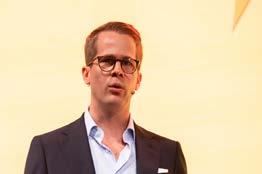
Another growing sector in the contingency space is personal accident insurance, which is pivotal for athletes and white-collar employees. This insurance variety shields non-guaranteed earnings in the event of injuries that hinder them from fulfilling their professional duties.
Arnold also unveiled two compelling trends shaping the contingency space: human disease and cyber risks. While exploring coverage for human diseases is in its infancy, cyber risks, a more familiar terrain, is a common exclusion in the contingency market but can be bought back for an additional premium.
The contingency class, historically grappling with performance challenges, was staring at an alarming 700% loss ratio during the COVID-19 years. This stark reality has thrust the market into an exceptionally challenging phase, demanding a reassessment of strategies and approaches, and marked by rate hikes ranging from 25% to a staggering 100%. The omnipresent COVID-19 exclusion has triggered a market contraction, resulting in diminished capacity.
In an industry grappling with unprecedented challenges, Arnold’s comprehensive overview provided a roadmap for navigating the complex contours of contingency insurance, offering timely and invaluable insights.


The Brokerslink Conference 2023 in Sao Paulo warmly welcomed the talented young students of Casa José Coltro for a moment of solidarity, music and entertainment. The children brought their heartfelt enjoyment of music, and some Brazilian vibrancy to the conference hall, with a raucous and thoroughly enjoyable percussive musical interlude.
MDS Brazil supports Casa José Coltro, an institution caring for 420 children in Sao Paulo, as part of their social responsibility program. This program, named Reciprocidade, focuses on financial aid, employee engagement, and creating job opportunities for the students in the project.
This heartfelt collaboration exemplifies a unique approach to corporate responsibility. Beyond pursuing profits, it is essential to actively contribute to the communities around us, to foster positive change, and to make a meaningful impact on the lives of others and, most importantly, in the future.

Diversity fosters various perspectives, enhancing problem-solving, driving adaptability, and ultimately boosting a company’s competitiveness in the dynamic business landscape. The presentation “Inclusive Culture and Diversity: Global and Plural Organisations” highlighted this topic, which is still lightly addressed in the insurance industry.
Rachel Maia, founder and CEO of RM Consulting, is a leader with a rich background, including executive roles at Lacoste S.A. (Brazil) and Tiffany & Co. As a trailblazing black woman CEO in Brazil, Rachel’s impactful career extends to philanthropy, board positions, and, most recently, as President of the Board of Directors of the UN Global Compact in Brazil.
The executive shared her background story at the Brokerslink Conference 2023 and highlighted the importance of a more diverse and inclusive business environment in the insurance and broking sectors.
The youngest of seven siblings, Maia was pushed by her parents to get an education, even though they didn’t have the money to pay for it. They knew that public schools in Brazil weren’t the best. “That’s why I don’t see much diversity when I look at an audience like this one in Brazil. I’m invited to speak at many companies here and always push them on this point. Why isn’t there more diversity in the audience? Because people are not being prepared properly, and companies are not opening up space for diversity”, stated the executive.
Maia says diversity must be addressed throughout all Latin American countries and the world. “It’s not fair. Why
are we responsible for creating opportunities in the insurance market? We are responsible for sitting back and observing our surroundings. If we see too many people like us, we must ask questions. I’m doing my part to create opportunities. I’m not asking for favours. I’m just asking you to open up opportunities. You’re not doing anyone a favour. If you want to survive, you need to open up opportunities.”
Innovation means diversity of thought, so Rachel is fighting to change the market. “I don’t want to be the only woman in Brazil to have a CEO position at a global company,” she said. Rachel spent most of her life studying so that she could be able to transform the world she lives in.
She has 28 years of experience as a president and CEO, and she was the only woman to be president and CFO of Pandora. “When I was Pandora’s CEO, I experienced cultural diversity first-hand. I learned that we need to be more open-minded and accepting of people who are different from us. I also learned that we need to be more careful about our behaviour when we don’t see people like us, including how we dress”, she told the executive.
The executive believes the insurance market is looking for diversity and inclusion, but she doesn’t see it reflected in the audiences at conferences and events. If the insurance market is serious about diversity and inclusion, it needs to make a more concerted effort to open up opportunities for people from all walks of life.
Everyone in the market has a role in this, change starts with all of us.
AND

Climate change is having a profound impact on our planet in ways that are beyond our understanding today. The planet’s temperature is rising, with consequences such as melting ice caps and glaciers, elevated sea levels, and severe weather events. These changes are disrupting ecosystems, displacing communities, and endangering food and water security. The effects of climate change on a global scale are already evident and will undoubtedly become more catastrophic in the coming decades.
Alexandre da Rosa, Founder and CEO of WMF GREEN ENERGY, discussed the importance of the environment. The Amazon rainforest is the largest worldwide, covering over 5.5 million square kilometers. It is home to an incredible diversity of plant and animal life and is vital in regulating the Earth’s climate. The rainforest absorbs carbon dioxide from the atmosphere, helping to mitigate climate change. However, deforestation, illegal mining and other human activities threaten the Amazon and the climate. In the last 10 years, 0.63 trillion Euros were lost in climate-related events in the Amazon basin.
“In a world without climate change, the insurance cost would be significantly lower because there would be fewer extreme weather events, such as hurricanes, floods, and droughts. These events cause billions of dollars in damage
yearly, becoming more frequent and severe due to climate change,” explained Alexandre da Rosa.
This growing severity poses challenges for insurance companies, as they rely on risk analysis to gauge the likelihood and cost of such events. The increasing frequency and intensity of extreme weather events, driven by climate change, complicate accurate risk assessments, impacting the cost and damage associated with these incidents.
As a response to this evolving risk landscape, businesses can implement various measures to mitigate climate-related risks. These actions include reducing carbon footprints, investing in renewable energy, enhancing infrastructure resilience to extreme weather events, and securing insurance coverage to safeguard against climate-related losses.
It is essential to understand the impact of the Amazon rainforest on climate change and the cost of insurance, understanding that businesses can play a role in mitigating climate risk. Companies must be transparent about their impact on the climatic agenda and set ambitious goals for reducing carbon emissions. Also, companies should consider investing in renewable energy and energy efficiency measures. We should all work together to protect the Amazon rainforest and mitigate the risks climate change are putting the world through.
At the end of the event, José Manuel Fonseca, President and CEO of Brokerslink, took the stage to express the company’s immense gratitude for the opportunity to gather so many industry players in the Brokerslink Conference 2023. He described the event as a series of wonderful days filled with valuable networking, enriching learning experiences, and enjoyable moments. Fonseca extended heartfelt thanks to everyone who played a crucial role in making the Conference a resounding success, including sponsors, speakers, attendees, and the dedicated team at Brokerslink.
“This Conference is meaningful in facilitating connections, fostering business collaboration, and formulating future plans. It was imperative for us to welcome new affiliates and integrate them into the vibrant Brokerslink community. And also reinforce our core values, including energy, friendship, business acumen, and genuine human connection, for all our partners.”
The Brokerslink Conference 2023 provided the industry with diverse, insightful presentations and engaging discussions that sparked thought-provoking ideas for the year ahead. In particular, the powerful presentation on the Amazon Forest reaffirmed its importance as one of the world’s most valuable natural resources. In order to organise such a complete event, it was necessary to invest in meticulous planning. “It was a lot of work creating a conference with meaningful content and context, and I am proud to say that the team and the speakers exceeded my expectations,” said Fonseca.
Fuelled by the collective enthusiasm, he announced with great excitement that the next Brokerslink Conference will be held in Abu Dhabi in 2024, between 13 and 15 of November. “It will be an amazing event, and I can’t wait to see everyone there!”





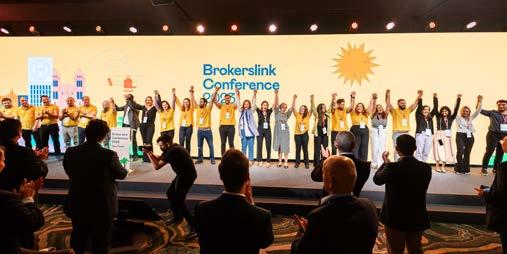








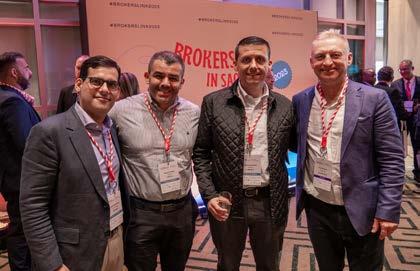

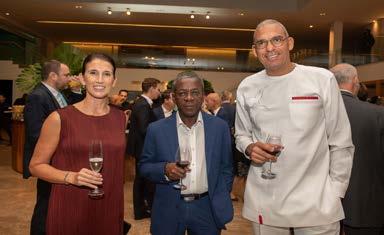

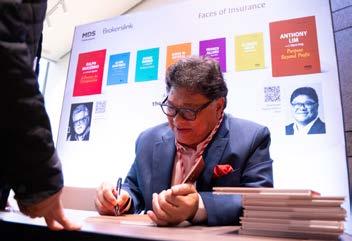







13–15 November 2024











